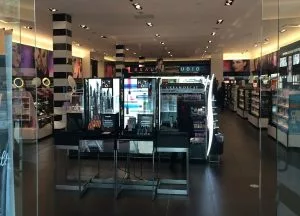
Since the ingredients in many traditional cosmetic products pose a health risk, it’s no wonder that consumers are searching for “natural” and “clean” products. In-house research at Sephora shows that 54% of its shoppers are looking for brands that are “free of” certain ingredients. As a result, new brands positioning themselves as “cleaner” alternatives to traditional cosmetics are exploding. “Natural” brands made up approximately one-quarter of all higher-end skincare sales in 2018, reflecting this consumer trend towards “clean” and “natural” products.
Cosmetics retailers are noticing the trend, and “natural” products are moving from specialty stores to the mainstream marketplace. Major stores like Target and CVS are expanding their “natural” cosmetics offerings and Sephora, already carrying an expansive line of “natural” beauty products, launched a clean beauty initiative, giving products that are free of toxic ingredients a special green label. That all sounds great! But, what do “natural,” “clean,” and “green” actually mean in the cosmetics world?
Nothing! No governing body regulates those terms, so a company can call a product “natural” or “clean” and define the term however it wants. And, there is a lot of incentive to do so, since 90% of consumers believe that natural beauty ingredients were better for them. Usually, “natural” means plant-based and “clean” means free of certain products, such as parabens, phthalates, or sulfates. However, nothing guarantees this, and some consumers are starting to catch on. For example, a recent class-action lawsuit accuses Tarte Cosmetics of misleading consumers. The complaint alleges that Tarte’s “high-performance naturals” line includes synthetic ingredients and that the “natural” label misleads consumers into purchasing synthetic products. This is just one example of the cosmetics industry taking advantage of consumers’ fear of toxic chemicals.
Fortunately, this fear of toxic ingredients, coupled with the uncertainty surrounding “natural” and “clean” product labels, may finally have an upside: the cosmetics industry is asking for more oversight. This move is a reaction to consumers, who are mistrustful of the big cosmetic companies, turning to smaller, “cleaner” brands. Now, the big beauty companies—frustrated with having to reformulate products to compete with smaller brands whose “clean” products may not be as natural as they claim– want the government to step in with more regulation to help repair the damage done by the industry’s self-regulating scheme.
That the cosmetics industry is lobbying the federal government for more oversight, is a step in the right direction. But, until the FDA has more authority to act, the cosmetics industry is still allowed to mislead consumers about product safety, putting shoppers at risk. Some watchdog groups, like the Environmental Working Group (EWG), have stepped up and taken a hard look at the cosmetics industry to examine product safety and to educate consumers. For instance, EWG publishes, and regularly updates, a database of toxic-free products.
Overall, consumers must continue to be vigilant about their cosmetic purchases. If you or your family have been impacted by health problems following the longtime use of cosmetics, please call our toxic tort attorneys for a free and confidential case evaluation at 630-527-1595. Our legal team can help you determine if you have a case.
Blog written by Dayna Smith.

"*" indicates required fields